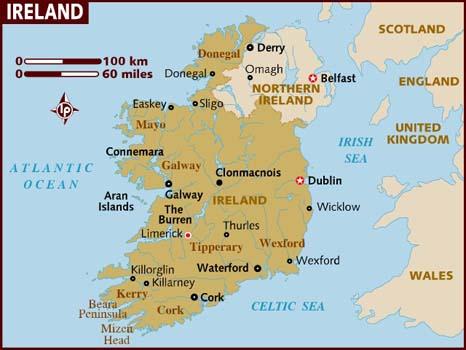The island of Ireland is situated on the North Atlantic. It is detached from the rest of the United Kingdom to its east by the St George’s Channel, the Irish Sea and the North Channel. Ireland has the second-largest island of the British Isles, the third-largest in Europe, and the twentieth-largest in the world
Ireland is politically separated between the Republic of Ireland (also called Ireland), which covers 83% of the island, and Northern Ireland, which is part of the United Kingdom, in the island’s northeast. The population of Ireland is estimated at 6.5 million, making it Europe’s second-most populous island after Great Britain. Around 4.7 million live in the Republic of Ireland while 1.8 million live in Northern Ireland.
The law regulating corporations evolved from the Irish Companies Act of 2014.
Benefits
Corporations in Ireland enjoy several benefits including:
• One of the Best Countries to do Business: In 2013, Forbes magazine selected Ireland as the best country for doing business worldwide.
• Over 1,000 Offshore Corporations: For being such a small country, Ireland is host to over 1,000 offshore corporations. That’s because Ireland is friendly towards foreign investors with an attractive financial status.
• One Shareholder: Only one shareholder is required for incorporation.
• Low Corporate Tax Rate: Compared to other European countries, Ireland has one of the lowest corporate tax rates which is only 12.5%.
• R&D Incentives: Another incentive for businesses that invest in research and development is a 25% refundable tax credit. Also, grants exist for research and development business activities as well.
• Holding Company Exemptions: Irish Holding companies enjoy EU tax exemptions on domestic and foreign income.
• Double Tax Treaties: Ireland has entered into many double taxation treaties with other countries preventing investors from paying double taxes on the same income.
Corporate Name
An Irish corporation must register a unique corporate name which does not belong to or is similar with another Irish corporation’s name. The corporation needs to reserve the corporate name with the Companies Registration Office. Incorporation registration in Ireland is only accepted in electronic format. Once the name is registered, the corporation must submit its name registration fee within one month.
Also, corporations are required to have their unique company seal which includes their corporate name.
Office Address and Local Agent Corporation in Ireland must have a registered agent and an Irish address to receive process serving documents and official notices. However, corporations are allowed to have a main address anywhere in the world.
Shareholders Irish corporations are required to have at least one shareholder and can have up to 149 shareholders.
Directors and Officers Ireland typically requires its corporations to have at least one resident director.
Authorized Capital Ireland’s new Commercial Code has no requirements for private limited liability companies to provide share capital. Private limited liability companies only carry liability for whatever is equal to the value of their ownership shares.
However, a minimum share capital is required of corporations. The expected share capital is 25,000 Euros. Before corporate operation, at least 25% of this required share capital amount needs to be deposited.
Taxes
In Ireland, domestic corporations must pay a flat 12.5% tax on trading (commercial) transactions known as “active” income, and 25% on non-trading transactions. Transactions that are defined as non-trading include money generated from rentals, foreign companies, interests, and royalties which are commonly known as “passive” income.
Furthermore, Ireland has established many double taxation treaties to ensure that corporations are not taxed twice on the same income.
Offshore corporations are taxed at the 12.5% corporate tax rate, which is one of the reasons why Ireland has become so attractive for foreign investors. Other tax savings include:
• A capital gains tax of 33% and 40%;
• stamp duty of 1% to 9;
• a carbon tax of 15 Euros per ton;

Annual Fees The yearly renewal fee for corporations in Ireland is £320.
Public Records Irish corporations must register at the CRO, and business names are included in this process. The privacy of a corporation’s public records follows Irish common law and court rulings. No legal requirements exist in Ireland to distinguish either the development or enforcement of corporate confidentiality clauses. Ireland does not possess any laws governing corporate confidentiality, including concepts like trade secrets. One way many corporations decide to protect themselves is to include confidentiality agreements or non-disclosure clauses with their Articles of Association.
Accounting and Audit Requirements In Ireland, the Companies Act of 2014 dictates the necessary record keeping. Accounting books that are current are required. Also, the corporation must prepare yearly financial statements at its annual general meeting, and these documents must also be registered with the CRO annually. Financial documents which must be submitted each year to the CRO include a profit and loss account; a balance sheet; a director’s report; and the statutory auditor’s report.
The corporation is also required to file an annual return with the CRO.
Annual General Meeting An annual general meeting is required in Ireland.
Time Required for Incorporation The time required for incorporation in Ireland is estimated at 2 to 3 days.
Shelf Corporations Shelf corporations are available in Ireland for faster incorporation.
Conclusion
Corporations in Ireland enjoy several benefits including: only one shareholder required to incorporate, low corporate tax rate, a great country to do business, great research & development incentives, several holding company tax exemptions, and many double taxation treaties so the same income will not be taxed twice.





